Analysis of Personal and Professional Development in Health Care
VerifiedAdded on 2020/01/15
|12
|4003
|237
Report
AI Summary
This report delves into the crucial aspects of personal and professional development within the health and social care (HSC) sector. It begins by comparing personal values and principles with the principles of support, emphasizing the interrelation between the two in providing effective patient care. The report assesses how personal culture and experiences influence support for service users, considering factors such as family background, age, and social ethics. It then explores the impact of new developments and changes on personal values and their effect on working in HSC, highlighting the importance of adapting to ensure better patient outcomes. The report further examines the nature of different professional relationships within health and social care, including management-staff and care worker-family member dynamics. It evaluates personal effectiveness in promoting and supporting individual rights and discusses methods for resolving issues in professional relationships. The report underscores the significance of ethical practices, effective communication, and continuous development in delivering quality care. This student-contributed report is available on Desklib, a platform offering AI-powered study tools and resources.
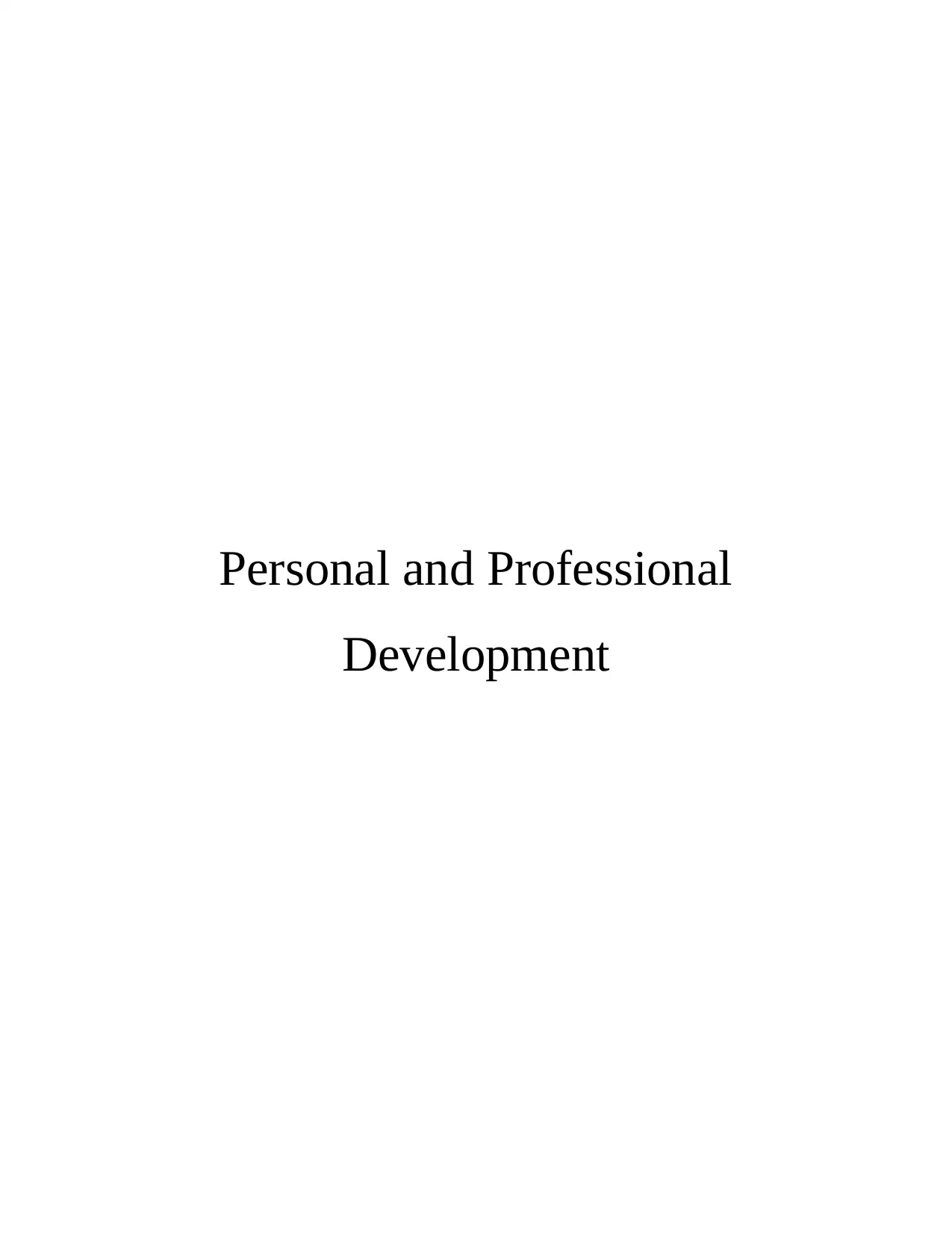
Personal and Professional
Development
Development
Paraphrase This Document
Need a fresh take? Get an instant paraphrase of this document with our AI Paraphraser
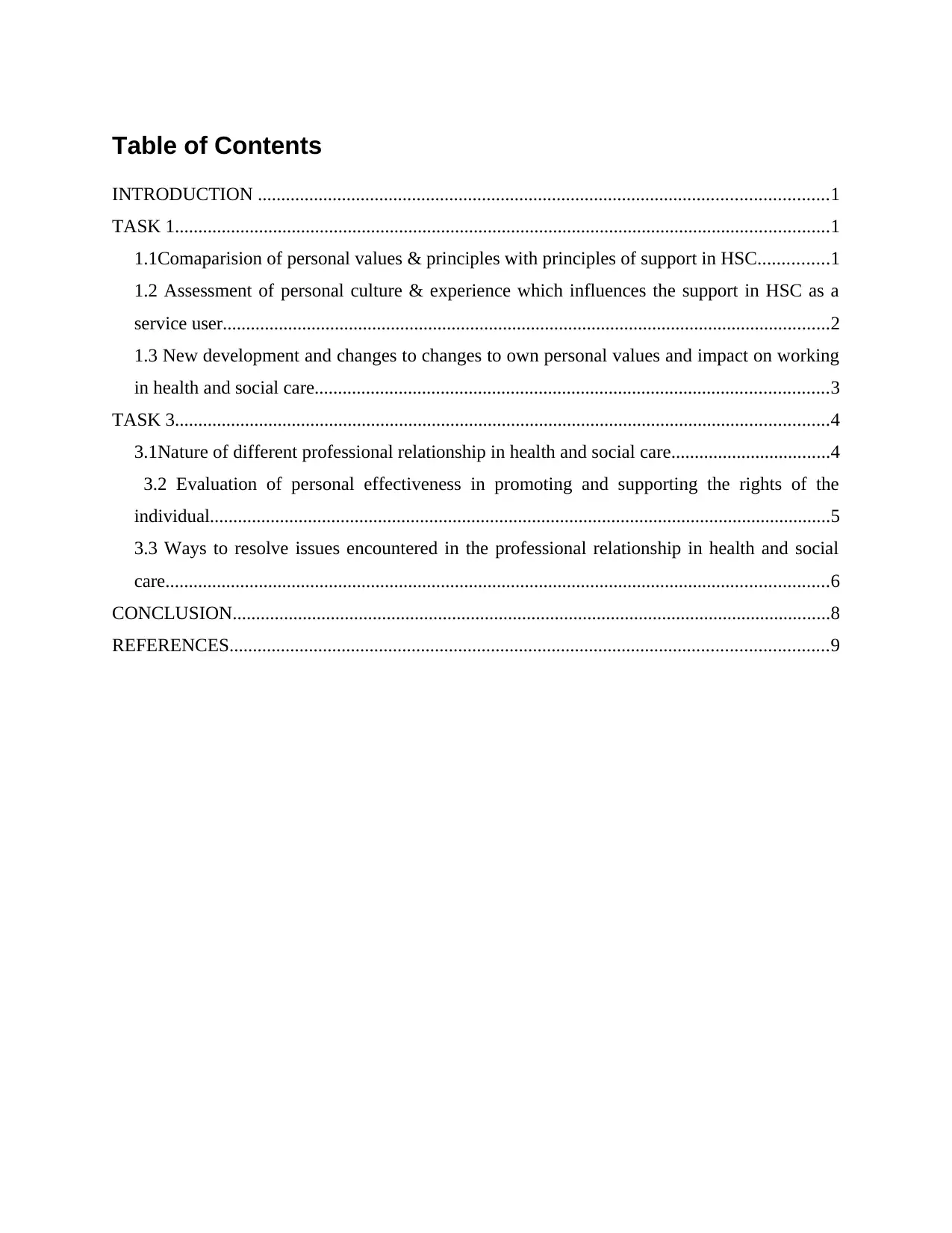
Table of Contents
INTRODUCTION ..........................................................................................................................1
TASK 1............................................................................................................................................1
1.1Comaparision of personal values & principles with principles of support in HSC...............1
1.2 Assessment of personal culture & experience which influences the support in HSC as a
service user..................................................................................................................................2
1.3 New development and changes to changes to own personal values and impact on working
in health and social care..............................................................................................................3
TASK 3............................................................................................................................................4
3.1Nature of different professional relationship in health and social care..................................4
3.2 Evaluation of personal effectiveness in promoting and supporting the rights of the
individual.....................................................................................................................................5
3.3 Ways to resolve issues encountered in the professional relationship in health and social
care..............................................................................................................................................6
CONCLUSION................................................................................................................................8
REFERENCES................................................................................................................................9
INTRODUCTION ..........................................................................................................................1
TASK 1............................................................................................................................................1
1.1Comaparision of personal values & principles with principles of support in HSC...............1
1.2 Assessment of personal culture & experience which influences the support in HSC as a
service user..................................................................................................................................2
1.3 New development and changes to changes to own personal values and impact on working
in health and social care..............................................................................................................3
TASK 3............................................................................................................................................4
3.1Nature of different professional relationship in health and social care..................................4
3.2 Evaluation of personal effectiveness in promoting and supporting the rights of the
individual.....................................................................................................................................5
3.3 Ways to resolve issues encountered in the professional relationship in health and social
care..............................................................................................................................................6
CONCLUSION................................................................................................................................8
REFERENCES................................................................................................................................9
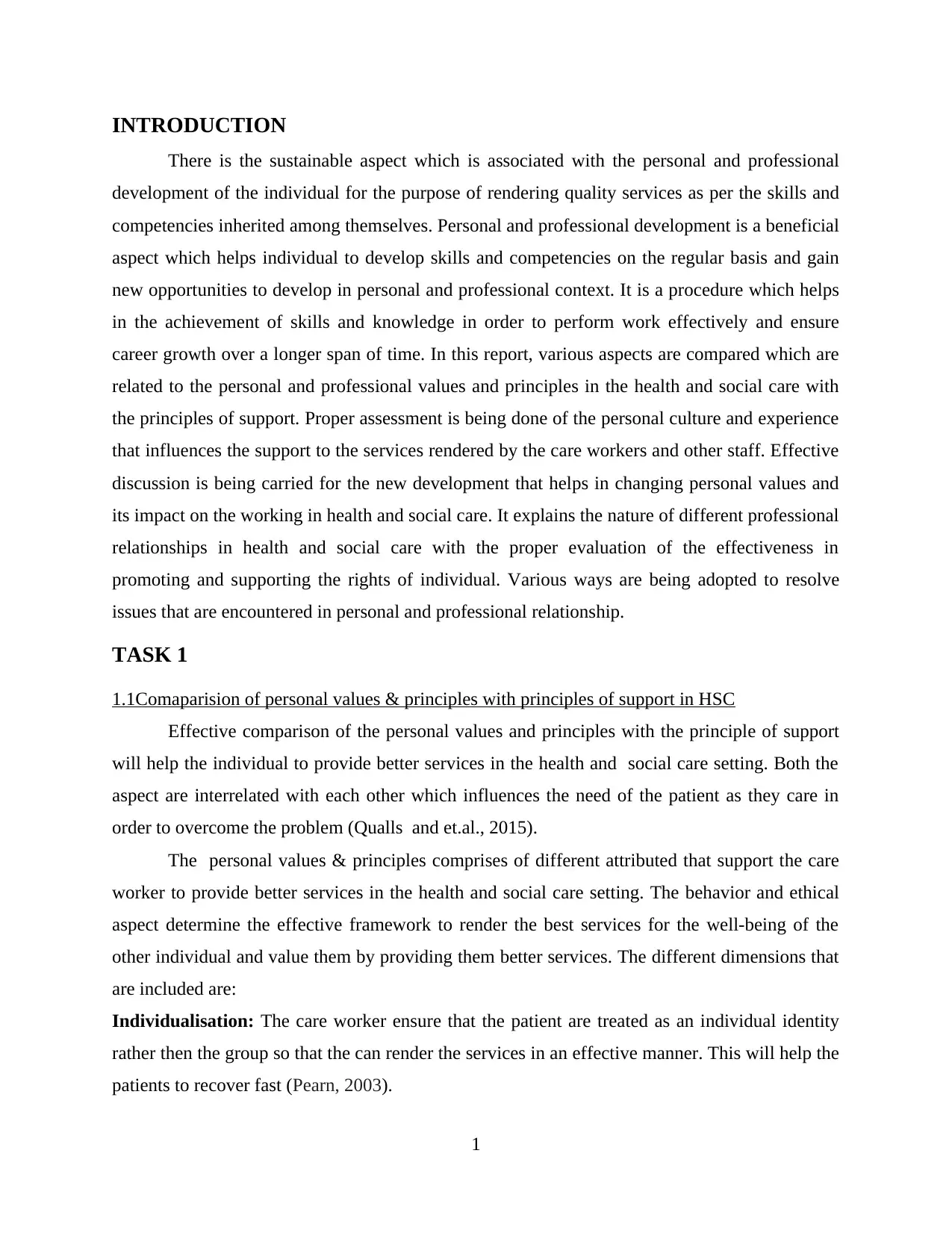
INTRODUCTION
There is the sustainable aspect which is associated with the personal and professional
development of the individual for the purpose of rendering quality services as per the skills and
competencies inherited among themselves. Personal and professional development is a beneficial
aspect which helps individual to develop skills and competencies on the regular basis and gain
new opportunities to develop in personal and professional context. It is a procedure which helps
in the achievement of skills and knowledge in order to perform work effectively and ensure
career growth over a longer span of time. In this report, various aspects are compared which are
related to the personal and professional values and principles in the health and social care with
the principles of support. Proper assessment is being done of the personal culture and experience
that influences the support to the services rendered by the care workers and other staff. Effective
discussion is being carried for the new development that helps in changing personal values and
its impact on the working in health and social care. It explains the nature of different professional
relationships in health and social care with the proper evaluation of the effectiveness in
promoting and supporting the rights of individual. Various ways are being adopted to resolve
issues that are encountered in personal and professional relationship.
TASK 1
1.1Comaparision of personal values & principles with principles of support in HSC
Effective comparison of the personal values and principles with the principle of support
will help the individual to provide better services in the health and social care setting. Both the
aspect are interrelated with each other which influences the need of the patient as they care in
order to overcome the problem (Qualls and et.al., 2015).
The personal values & principles comprises of different attributed that support the care
worker to provide better services in the health and social care setting. The behavior and ethical
aspect determine the effective framework to render the best services for the well-being of the
other individual and value them by providing them better services. The different dimensions that
are included are:
Individualisation: The care worker ensure that the patient are treated as an individual identity
rather then the group so that the can render the services in an effective manner. This will help the
patients to recover fast (Pearn, 2003).
1
There is the sustainable aspect which is associated with the personal and professional
development of the individual for the purpose of rendering quality services as per the skills and
competencies inherited among themselves. Personal and professional development is a beneficial
aspect which helps individual to develop skills and competencies on the regular basis and gain
new opportunities to develop in personal and professional context. It is a procedure which helps
in the achievement of skills and knowledge in order to perform work effectively and ensure
career growth over a longer span of time. In this report, various aspects are compared which are
related to the personal and professional values and principles in the health and social care with
the principles of support. Proper assessment is being done of the personal culture and experience
that influences the support to the services rendered by the care workers and other staff. Effective
discussion is being carried for the new development that helps in changing personal values and
its impact on the working in health and social care. It explains the nature of different professional
relationships in health and social care with the proper evaluation of the effectiveness in
promoting and supporting the rights of individual. Various ways are being adopted to resolve
issues that are encountered in personal and professional relationship.
TASK 1
1.1Comaparision of personal values & principles with principles of support in HSC
Effective comparison of the personal values and principles with the principle of support
will help the individual to provide better services in the health and social care setting. Both the
aspect are interrelated with each other which influences the need of the patient as they care in
order to overcome the problem (Qualls and et.al., 2015).
The personal values & principles comprises of different attributed that support the care
worker to provide better services in the health and social care setting. The behavior and ethical
aspect determine the effective framework to render the best services for the well-being of the
other individual and value them by providing them better services. The different dimensions that
are included are:
Individualisation: The care worker ensure that the patient are treated as an individual identity
rather then the group so that the can render the services in an effective manner. This will help the
patients to recover fast (Pearn, 2003).
1
⊘ This is a preview!⊘
Do you want full access?
Subscribe today to unlock all pages.

Trusted by 1+ million students worldwide
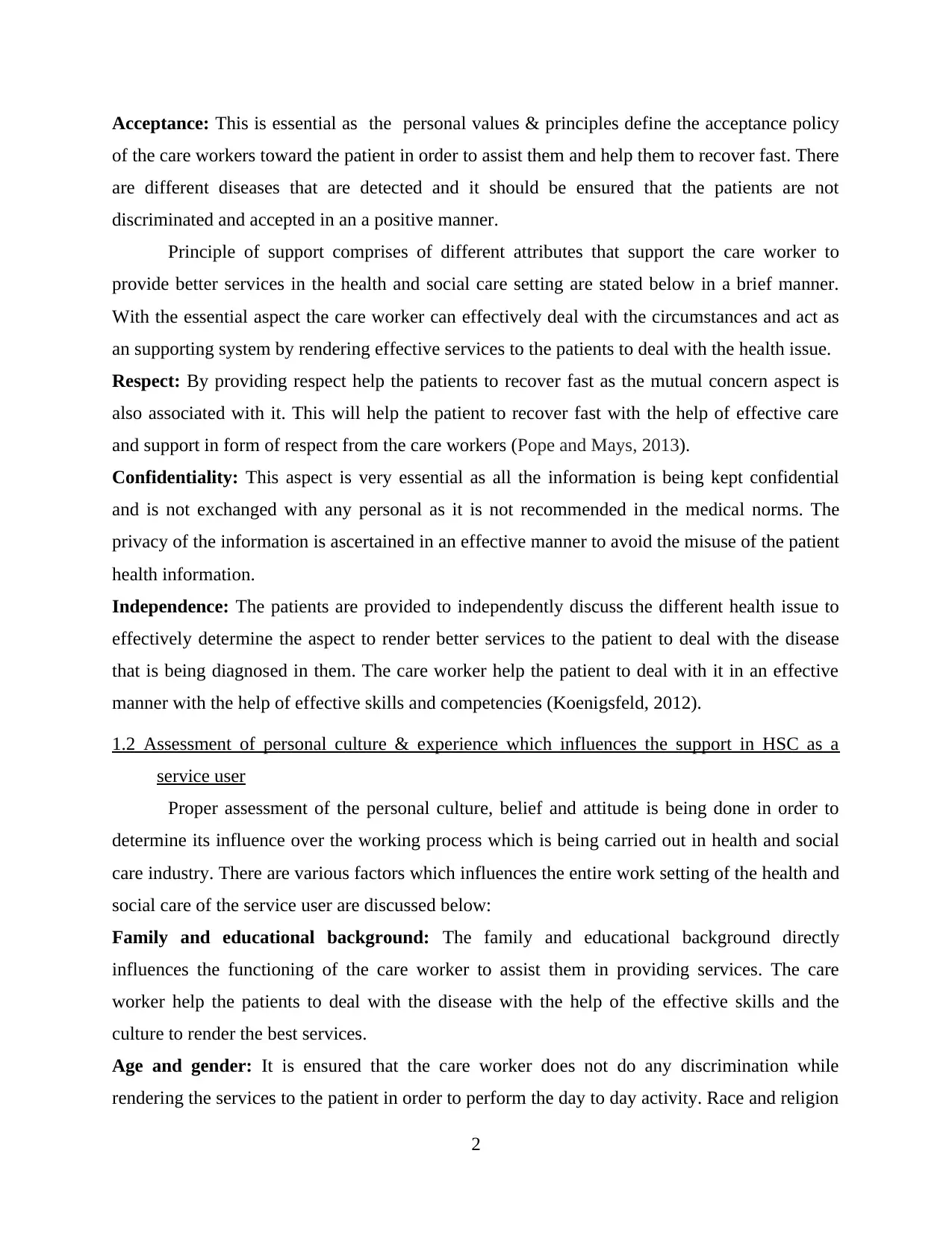
Acceptance: This is essential as the personal values & principles define the acceptance policy
of the care workers toward the patient in order to assist them and help them to recover fast. There
are different diseases that are detected and it should be ensured that the patients are not
discriminated and accepted in an a positive manner.
Principle of support comprises of different attributes that support the care worker to
provide better services in the health and social care setting are stated below in a brief manner.
With the essential aspect the care worker can effectively deal with the circumstances and act as
an supporting system by rendering effective services to the patients to deal with the health issue.
Respect: By providing respect help the patients to recover fast as the mutual concern aspect is
also associated with it. This will help the patient to recover fast with the help of effective care
and support in form of respect from the care workers (Pope and Mays, 2013).
Confidentiality: This aspect is very essential as all the information is being kept confidential
and is not exchanged with any personal as it is not recommended in the medical norms. The
privacy of the information is ascertained in an effective manner to avoid the misuse of the patient
health information.
Independence: The patients are provided to independently discuss the different health issue to
effectively determine the aspect to render better services to the patient to deal with the disease
that is being diagnosed in them. The care worker help the patient to deal with it in an effective
manner with the help of effective skills and competencies (Koenigsfeld, 2012).
1.2 Assessment of personal culture & experience which influences the support in HSC as a
service user
Proper assessment of the personal culture, belief and attitude is being done in order to
determine its influence over the working process which is being carried out in health and social
care industry. There are various factors which influences the entire work setting of the health and
social care of the service user are discussed below:
Family and educational background: The family and educational background directly
influences the functioning of the care worker to assist them in providing services. The care
worker help the patients to deal with the disease with the help of the effective skills and the
culture to render the best services.
Age and gender: It is ensured that the care worker does not do any discrimination while
rendering the services to the patient in order to perform the day to day activity. Race and religion
2
of the care workers toward the patient in order to assist them and help them to recover fast. There
are different diseases that are detected and it should be ensured that the patients are not
discriminated and accepted in an a positive manner.
Principle of support comprises of different attributes that support the care worker to
provide better services in the health and social care setting are stated below in a brief manner.
With the essential aspect the care worker can effectively deal with the circumstances and act as
an supporting system by rendering effective services to the patients to deal with the health issue.
Respect: By providing respect help the patients to recover fast as the mutual concern aspect is
also associated with it. This will help the patient to recover fast with the help of effective care
and support in form of respect from the care workers (Pope and Mays, 2013).
Confidentiality: This aspect is very essential as all the information is being kept confidential
and is not exchanged with any personal as it is not recommended in the medical norms. The
privacy of the information is ascertained in an effective manner to avoid the misuse of the patient
health information.
Independence: The patients are provided to independently discuss the different health issue to
effectively determine the aspect to render better services to the patient to deal with the disease
that is being diagnosed in them. The care worker help the patient to deal with it in an effective
manner with the help of effective skills and competencies (Koenigsfeld, 2012).
1.2 Assessment of personal culture & experience which influences the support in HSC as a
service user
Proper assessment of the personal culture, belief and attitude is being done in order to
determine its influence over the working process which is being carried out in health and social
care industry. There are various factors which influences the entire work setting of the health and
social care of the service user are discussed below:
Family and educational background: The family and educational background directly
influences the functioning of the care worker to assist them in providing services. The care
worker help the patients to deal with the disease with the help of the effective skills and the
culture to render the best services.
Age and gender: It is ensured that the care worker does not do any discrimination while
rendering the services to the patient in order to perform the day to day activity. Race and religion
2
Paraphrase This Document
Need a fresh take? Get an instant paraphrase of this document with our AI Paraphraser
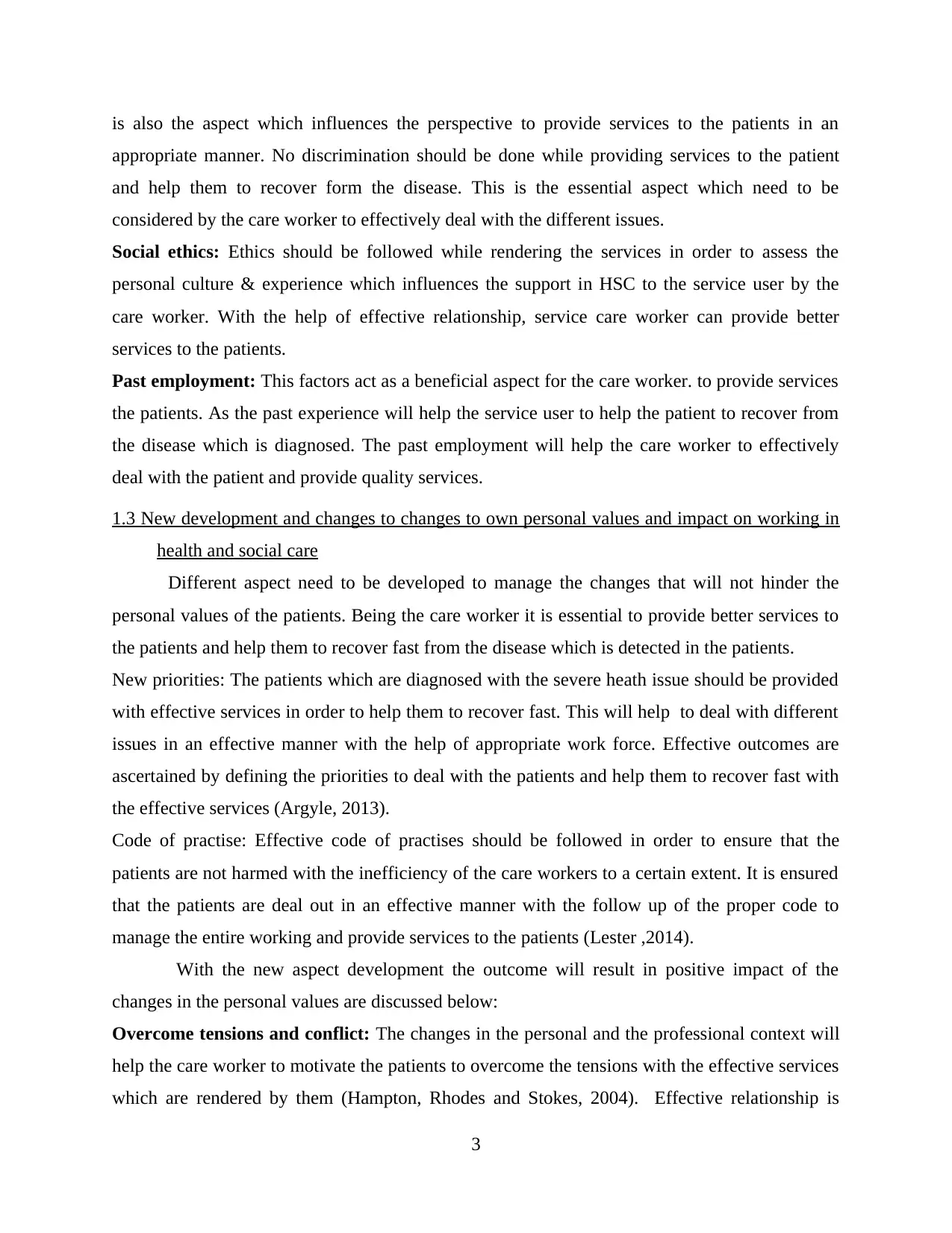
is also the aspect which influences the perspective to provide services to the patients in an
appropriate manner. No discrimination should be done while providing services to the patient
and help them to recover form the disease. This is the essential aspect which need to be
considered by the care worker to effectively deal with the different issues.
Social ethics: Ethics should be followed while rendering the services in order to assess the
personal culture & experience which influences the support in HSC to the service user by the
care worker. With the help of effective relationship, service care worker can provide better
services to the patients.
Past employment: This factors act as a beneficial aspect for the care worker. to provide services
the patients. As the past experience will help the service user to help the patient to recover from
the disease which is diagnosed. The past employment will help the care worker to effectively
deal with the patient and provide quality services.
1.3 New development and changes to changes to own personal values and impact on working in
health and social care
Different aspect need to be developed to manage the changes that will not hinder the
personal values of the patients. Being the care worker it is essential to provide better services to
the patients and help them to recover fast from the disease which is detected in the patients.
New priorities: The patients which are diagnosed with the severe heath issue should be provided
with effective services in order to help them to recover fast. This will help to deal with different
issues in an effective manner with the help of appropriate work force. Effective outcomes are
ascertained by defining the priorities to deal with the patients and help them to recover fast with
the effective services (Argyle, 2013).
Code of practise: Effective code of practises should be followed in order to ensure that the
patients are not harmed with the inefficiency of the care workers to a certain extent. It is ensured
that the patients are deal out in an effective manner with the follow up of the proper code to
manage the entire working and provide services to the patients (Lester ,2014).
With the new aspect development the outcome will result in positive impact of the
changes in the personal values are discussed below:
Overcome tensions and conflict: The changes in the personal and the professional context will
help the care worker to motivate the patients to overcome the tensions with the effective services
which are rendered by them (Hampton, Rhodes and Stokes, 2004). Effective relationship is
3
appropriate manner. No discrimination should be done while providing services to the patient
and help them to recover form the disease. This is the essential aspect which need to be
considered by the care worker to effectively deal with the different issues.
Social ethics: Ethics should be followed while rendering the services in order to assess the
personal culture & experience which influences the support in HSC to the service user by the
care worker. With the help of effective relationship, service care worker can provide better
services to the patients.
Past employment: This factors act as a beneficial aspect for the care worker. to provide services
the patients. As the past experience will help the service user to help the patient to recover from
the disease which is diagnosed. The past employment will help the care worker to effectively
deal with the patient and provide quality services.
1.3 New development and changes to changes to own personal values and impact on working in
health and social care
Different aspect need to be developed to manage the changes that will not hinder the
personal values of the patients. Being the care worker it is essential to provide better services to
the patients and help them to recover fast from the disease which is detected in the patients.
New priorities: The patients which are diagnosed with the severe heath issue should be provided
with effective services in order to help them to recover fast. This will help to deal with different
issues in an effective manner with the help of appropriate work force. Effective outcomes are
ascertained by defining the priorities to deal with the patients and help them to recover fast with
the effective services (Argyle, 2013).
Code of practise: Effective code of practises should be followed in order to ensure that the
patients are not harmed with the inefficiency of the care workers to a certain extent. It is ensured
that the patients are deal out in an effective manner with the follow up of the proper code to
manage the entire working and provide services to the patients (Lester ,2014).
With the new aspect development the outcome will result in positive impact of the
changes in the personal values are discussed below:
Overcome tensions and conflict: The changes in the personal and the professional context will
help the care worker to motivate the patients to overcome the tensions with the effective services
which are rendered by them (Hampton, Rhodes and Stokes, 2004). Effective relationship is
3
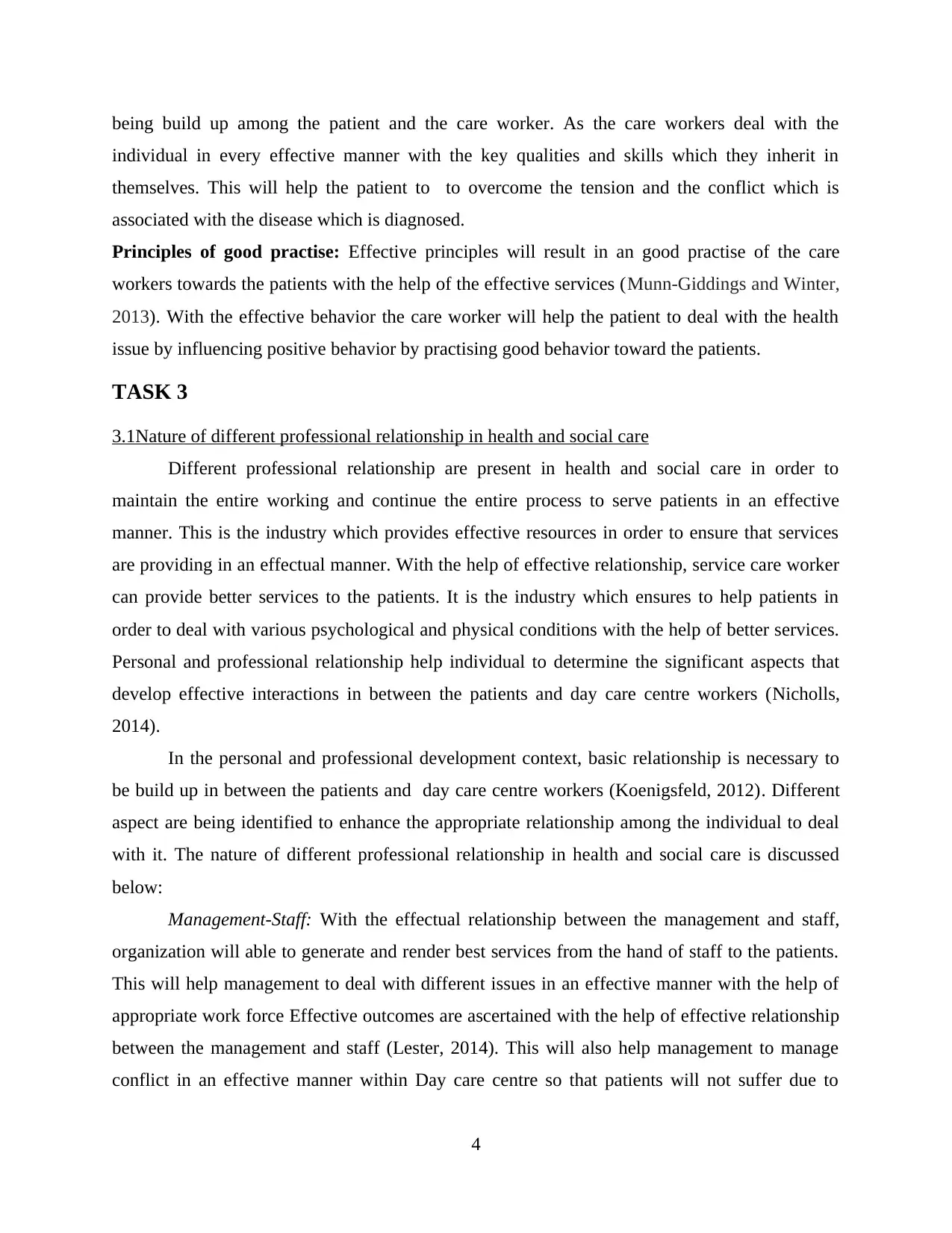
being build up among the patient and the care worker. As the care workers deal with the
individual in every effective manner with the key qualities and skills which they inherit in
themselves. This will help the patient to to overcome the tension and the conflict which is
associated with the disease which is diagnosed.
Principles of good practise: Effective principles will result in an good practise of the care
workers towards the patients with the help of the effective services (Munn-Giddings and Winter,
2013). With the effective behavior the care worker will help the patient to deal with the health
issue by influencing positive behavior by practising good behavior toward the patients.
TASK 3
3.1Nature of different professional relationship in health and social care
Different professional relationship are present in health and social care in order to
maintain the entire working and continue the entire process to serve patients in an effective
manner. This is the industry which provides effective resources in order to ensure that services
are providing in an effectual manner. With the help of effective relationship, service care worker
can provide better services to the patients. It is the industry which ensures to help patients in
order to deal with various psychological and physical conditions with the help of better services.
Personal and professional relationship help individual to determine the significant aspects that
develop effective interactions in between the patients and day care centre workers (Nicholls,
2014).
In the personal and professional development context, basic relationship is necessary to
be build up in between the patients and day care centre workers (Koenigsfeld, 2012). Different
aspect are being identified to enhance the appropriate relationship among the individual to deal
with it. The nature of different professional relationship in health and social care is discussed
below:
Management-Staff: With the effectual relationship between the management and staff,
organization will able to generate and render best services from the hand of staff to the patients.
This will help management to deal with different issues in an effective manner with the help of
appropriate work force Effective outcomes are ascertained with the help of effective relationship
between the management and staff (Lester, 2014). This will also help management to manage
conflict in an effective manner within Day care centre so that patients will not suffer due to
4
individual in every effective manner with the key qualities and skills which they inherit in
themselves. This will help the patient to to overcome the tension and the conflict which is
associated with the disease which is diagnosed.
Principles of good practise: Effective principles will result in an good practise of the care
workers towards the patients with the help of the effective services (Munn-Giddings and Winter,
2013). With the effective behavior the care worker will help the patient to deal with the health
issue by influencing positive behavior by practising good behavior toward the patients.
TASK 3
3.1Nature of different professional relationship in health and social care
Different professional relationship are present in health and social care in order to
maintain the entire working and continue the entire process to serve patients in an effective
manner. This is the industry which provides effective resources in order to ensure that services
are providing in an effectual manner. With the help of effective relationship, service care worker
can provide better services to the patients. It is the industry which ensures to help patients in
order to deal with various psychological and physical conditions with the help of better services.
Personal and professional relationship help individual to determine the significant aspects that
develop effective interactions in between the patients and day care centre workers (Nicholls,
2014).
In the personal and professional development context, basic relationship is necessary to
be build up in between the patients and day care centre workers (Koenigsfeld, 2012). Different
aspect are being identified to enhance the appropriate relationship among the individual to deal
with it. The nature of different professional relationship in health and social care is discussed
below:
Management-Staff: With the effectual relationship between the management and staff,
organization will able to generate and render best services from the hand of staff to the patients.
This will help management to deal with different issues in an effective manner with the help of
appropriate work force Effective outcomes are ascertained with the help of effective relationship
between the management and staff (Lester, 2014). This will also help management to manage
conflict in an effective manner within Day care centre so that patients will not suffer due to
4
⊘ This is a preview!⊘
Do you want full access?
Subscribe today to unlock all pages.

Trusted by 1+ million students worldwide
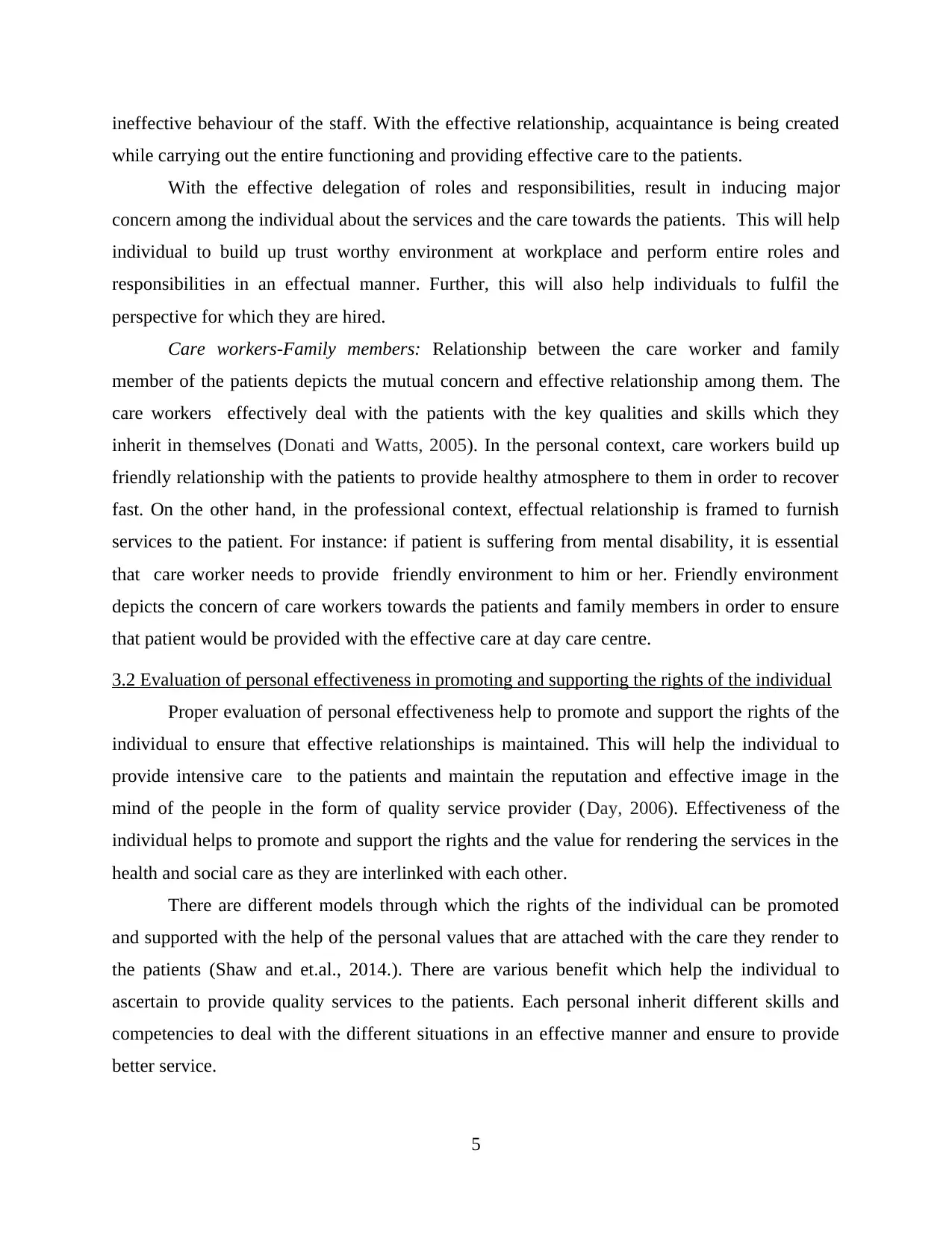
ineffective behaviour of the staff. With the effective relationship, acquaintance is being created
while carrying out the entire functioning and providing effective care to the patients.
With the effective delegation of roles and responsibilities, result in inducing major
concern among the individual about the services and the care towards the patients. This will help
individual to build up trust worthy environment at workplace and perform entire roles and
responsibilities in an effectual manner. Further, this will also help individuals to fulfil the
perspective for which they are hired.
Care workers-Family members: Relationship between the care worker and family
member of the patients depicts the mutual concern and effective relationship among them. The
care workers effectively deal with the patients with the key qualities and skills which they
inherit in themselves (Donati and Watts, 2005). In the personal context, care workers build up
friendly relationship with the patients to provide healthy atmosphere to them in order to recover
fast. On the other hand, in the professional context, effectual relationship is framed to furnish
services to the patient. For instance: if patient is suffering from mental disability, it is essential
that care worker needs to provide friendly environment to him or her. Friendly environment
depicts the concern of care workers towards the patients and family members in order to ensure
that patient would be provided with the effective care at day care centre.
3.2 Evaluation of personal effectiveness in promoting and supporting the rights of the individual
Proper evaluation of personal effectiveness help to promote and support the rights of the
individual to ensure that effective relationships is maintained. This will help the individual to
provide intensive care to the patients and maintain the reputation and effective image in the
mind of the people in the form of quality service provider (Day, 2006). Effectiveness of the
individual helps to promote and support the rights and the value for rendering the services in the
health and social care as they are interlinked with each other.
There are different models through which the rights of the individual can be promoted
and supported with the help of the personal values that are attached with the care they render to
the patients (Shaw and et.al., 2014.). There are various benefit which help the individual to
ascertain to provide quality services to the patients. Each personal inherit different skills and
competencies to deal with the different situations in an effective manner and ensure to provide
better service.
5
while carrying out the entire functioning and providing effective care to the patients.
With the effective delegation of roles and responsibilities, result in inducing major
concern among the individual about the services and the care towards the patients. This will help
individual to build up trust worthy environment at workplace and perform entire roles and
responsibilities in an effectual manner. Further, this will also help individuals to fulfil the
perspective for which they are hired.
Care workers-Family members: Relationship between the care worker and family
member of the patients depicts the mutual concern and effective relationship among them. The
care workers effectively deal with the patients with the key qualities and skills which they
inherit in themselves (Donati and Watts, 2005). In the personal context, care workers build up
friendly relationship with the patients to provide healthy atmosphere to them in order to recover
fast. On the other hand, in the professional context, effectual relationship is framed to furnish
services to the patient. For instance: if patient is suffering from mental disability, it is essential
that care worker needs to provide friendly environment to him or her. Friendly environment
depicts the concern of care workers towards the patients and family members in order to ensure
that patient would be provided with the effective care at day care centre.
3.2 Evaluation of personal effectiveness in promoting and supporting the rights of the individual
Proper evaluation of personal effectiveness help to promote and support the rights of the
individual to ensure that effective relationships is maintained. This will help the individual to
provide intensive care to the patients and maintain the reputation and effective image in the
mind of the people in the form of quality service provider (Day, 2006). Effectiveness of the
individual helps to promote and support the rights and the value for rendering the services in the
health and social care as they are interlinked with each other.
There are different models through which the rights of the individual can be promoted
and supported with the help of the personal values that are attached with the care they render to
the patients (Shaw and et.al., 2014.). There are various benefit which help the individual to
ascertain to provide quality services to the patients. Each personal inherit different skills and
competencies to deal with the different situations in an effective manner and ensure to provide
better service.
5
Paraphrase This Document
Need a fresh take? Get an instant paraphrase of this document with our AI Paraphraser
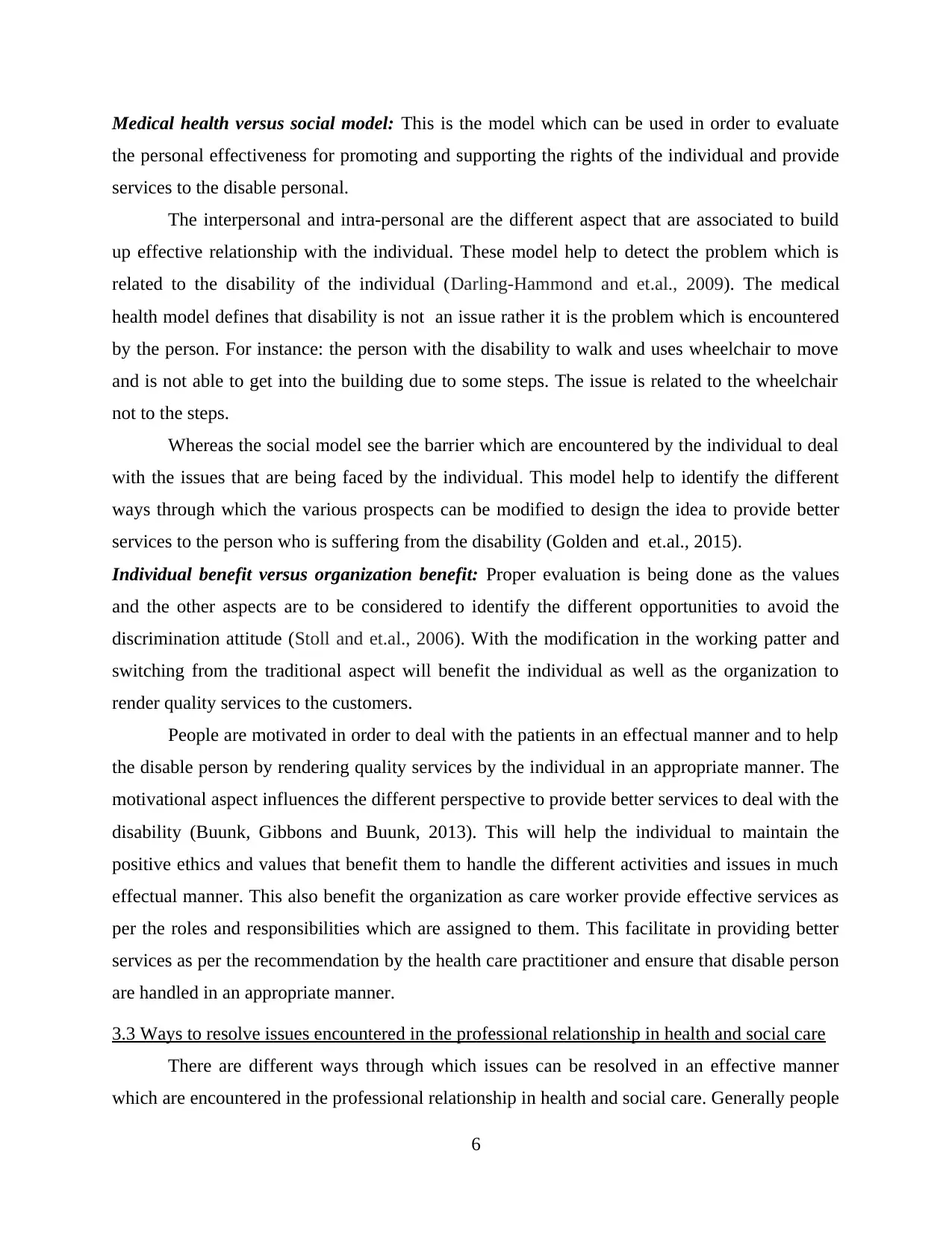
Medical health versus social model: This is the model which can be used in order to evaluate
the personal effectiveness for promoting and supporting the rights of the individual and provide
services to the disable personal.
The interpersonal and intra-personal are the different aspect that are associated to build
up effective relationship with the individual. These model help to detect the problem which is
related to the disability of the individual (Darling-Hammond and et.al., 2009). The medical
health model defines that disability is not an issue rather it is the problem which is encountered
by the person. For instance: the person with the disability to walk and uses wheelchair to move
and is not able to get into the building due to some steps. The issue is related to the wheelchair
not to the steps.
Whereas the social model see the barrier which are encountered by the individual to deal
with the issues that are being faced by the individual. This model help to identify the different
ways through which the various prospects can be modified to design the idea to provide better
services to the person who is suffering from the disability (Golden and et.al., 2015).
Individual benefit versus organization benefit: Proper evaluation is being done as the values
and the other aspects are to be considered to identify the different opportunities to avoid the
discrimination attitude (Stoll and et.al., 2006). With the modification in the working patter and
switching from the traditional aspect will benefit the individual as well as the organization to
render quality services to the customers.
People are motivated in order to deal with the patients in an effectual manner and to help
the disable person by rendering quality services by the individual in an appropriate manner. The
motivational aspect influences the different perspective to provide better services to deal with the
disability (Buunk, Gibbons and Buunk, 2013). This will help the individual to maintain the
positive ethics and values that benefit them to handle the different activities and issues in much
effectual manner. This also benefit the organization as care worker provide effective services as
per the roles and responsibilities which are assigned to them. This facilitate in providing better
services as per the recommendation by the health care practitioner and ensure that disable person
are handled in an appropriate manner.
3.3 Ways to resolve issues encountered in the professional relationship in health and social care
There are different ways through which issues can be resolved in an effective manner
which are encountered in the professional relationship in health and social care. Generally people
6
the personal effectiveness for promoting and supporting the rights of the individual and provide
services to the disable personal.
The interpersonal and intra-personal are the different aspect that are associated to build
up effective relationship with the individual. These model help to detect the problem which is
related to the disability of the individual (Darling-Hammond and et.al., 2009). The medical
health model defines that disability is not an issue rather it is the problem which is encountered
by the person. For instance: the person with the disability to walk and uses wheelchair to move
and is not able to get into the building due to some steps. The issue is related to the wheelchair
not to the steps.
Whereas the social model see the barrier which are encountered by the individual to deal
with the issues that are being faced by the individual. This model help to identify the different
ways through which the various prospects can be modified to design the idea to provide better
services to the person who is suffering from the disability (Golden and et.al., 2015).
Individual benefit versus organization benefit: Proper evaluation is being done as the values
and the other aspects are to be considered to identify the different opportunities to avoid the
discrimination attitude (Stoll and et.al., 2006). With the modification in the working patter and
switching from the traditional aspect will benefit the individual as well as the organization to
render quality services to the customers.
People are motivated in order to deal with the patients in an effectual manner and to help
the disable person by rendering quality services by the individual in an appropriate manner. The
motivational aspect influences the different perspective to provide better services to deal with the
disability (Buunk, Gibbons and Buunk, 2013). This will help the individual to maintain the
positive ethics and values that benefit them to handle the different activities and issues in much
effectual manner. This also benefit the organization as care worker provide effective services as
per the roles and responsibilities which are assigned to them. This facilitate in providing better
services as per the recommendation by the health care practitioner and ensure that disable person
are handled in an appropriate manner.
3.3 Ways to resolve issues encountered in the professional relationship in health and social care
There are different ways through which issues can be resolved in an effective manner
which are encountered in the professional relationship in health and social care. Generally people
6
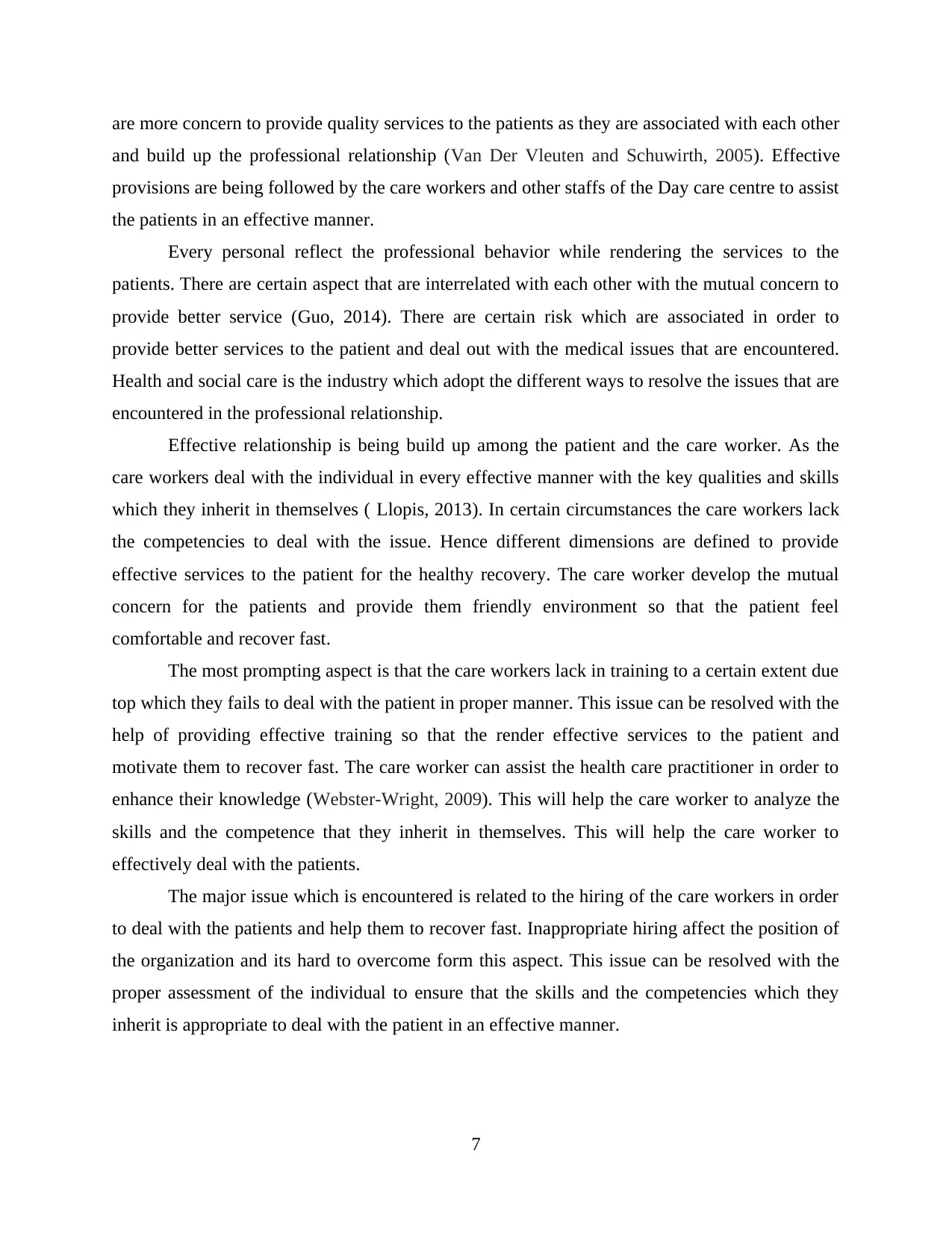
are more concern to provide quality services to the patients as they are associated with each other
and build up the professional relationship (Van Der Vleuten and Schuwirth, 2005). Effective
provisions are being followed by the care workers and other staffs of the Day care centre to assist
the patients in an effective manner.
Every personal reflect the professional behavior while rendering the services to the
patients. There are certain aspect that are interrelated with each other with the mutual concern to
provide better service (Guo, 2014). There are certain risk which are associated in order to
provide better services to the patient and deal out with the medical issues that are encountered.
Health and social care is the industry which adopt the different ways to resolve the issues that are
encountered in the professional relationship.
Effective relationship is being build up among the patient and the care worker. As the
care workers deal with the individual in every effective manner with the key qualities and skills
which they inherit in themselves ( Llopis, 2013). In certain circumstances the care workers lack
the competencies to deal with the issue. Hence different dimensions are defined to provide
effective services to the patient for the healthy recovery. The care worker develop the mutual
concern for the patients and provide them friendly environment so that the patient feel
comfortable and recover fast.
The most prompting aspect is that the care workers lack in training to a certain extent due
top which they fails to deal with the patient in proper manner. This issue can be resolved with the
help of providing effective training so that the render effective services to the patient and
motivate them to recover fast. The care worker can assist the health care practitioner in order to
enhance their knowledge (Webster-Wright, 2009). This will help the care worker to analyze the
skills and the competence that they inherit in themselves. This will help the care worker to
effectively deal with the patients.
The major issue which is encountered is related to the hiring of the care workers in order
to deal with the patients and help them to recover fast. Inappropriate hiring affect the position of
the organization and its hard to overcome form this aspect. This issue can be resolved with the
proper assessment of the individual to ensure that the skills and the competencies which they
inherit is appropriate to deal with the patient in an effective manner.
7
and build up the professional relationship (Van Der Vleuten and Schuwirth, 2005). Effective
provisions are being followed by the care workers and other staffs of the Day care centre to assist
the patients in an effective manner.
Every personal reflect the professional behavior while rendering the services to the
patients. There are certain aspect that are interrelated with each other with the mutual concern to
provide better service (Guo, 2014). There are certain risk which are associated in order to
provide better services to the patient and deal out with the medical issues that are encountered.
Health and social care is the industry which adopt the different ways to resolve the issues that are
encountered in the professional relationship.
Effective relationship is being build up among the patient and the care worker. As the
care workers deal with the individual in every effective manner with the key qualities and skills
which they inherit in themselves ( Llopis, 2013). In certain circumstances the care workers lack
the competencies to deal with the issue. Hence different dimensions are defined to provide
effective services to the patient for the healthy recovery. The care worker develop the mutual
concern for the patients and provide them friendly environment so that the patient feel
comfortable and recover fast.
The most prompting aspect is that the care workers lack in training to a certain extent due
top which they fails to deal with the patient in proper manner. This issue can be resolved with the
help of providing effective training so that the render effective services to the patient and
motivate them to recover fast. The care worker can assist the health care practitioner in order to
enhance their knowledge (Webster-Wright, 2009). This will help the care worker to analyze the
skills and the competence that they inherit in themselves. This will help the care worker to
effectively deal with the patients.
The major issue which is encountered is related to the hiring of the care workers in order
to deal with the patients and help them to recover fast. Inappropriate hiring affect the position of
the organization and its hard to overcome form this aspect. This issue can be resolved with the
proper assessment of the individual to ensure that the skills and the competencies which they
inherit is appropriate to deal with the patient in an effective manner.
7
⊘ This is a preview!⊘
Do you want full access?
Subscribe today to unlock all pages.

Trusted by 1+ million students worldwide
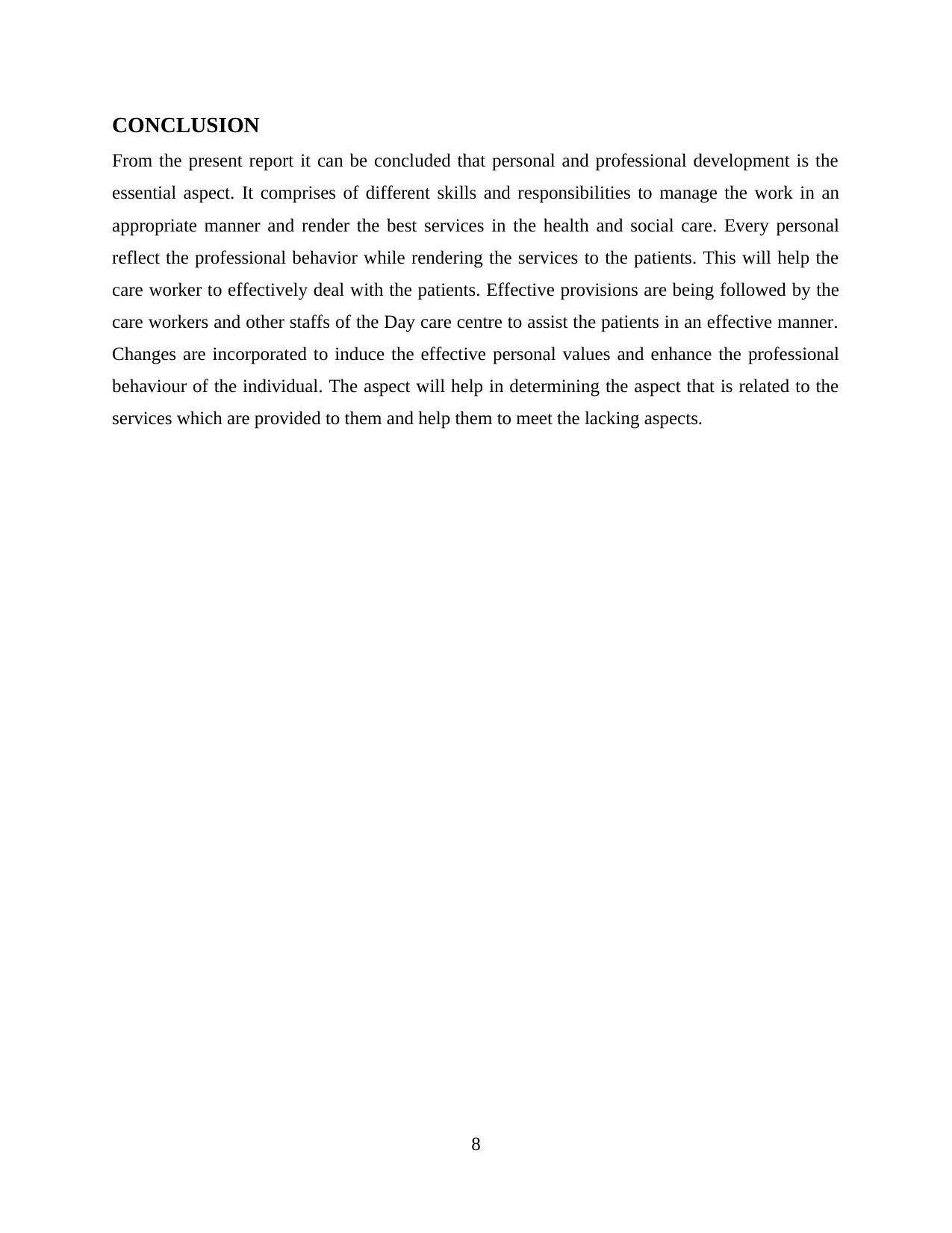
CONCLUSION
From the present report it can be concluded that personal and professional development is the
essential aspect. It comprises of different skills and responsibilities to manage the work in an
appropriate manner and render the best services in the health and social care. Every personal
reflect the professional behavior while rendering the services to the patients. This will help the
care worker to effectively deal with the patients. Effective provisions are being followed by the
care workers and other staffs of the Day care centre to assist the patients in an effective manner.
Changes are incorporated to induce the effective personal values and enhance the professional
behaviour of the individual. The aspect will help in determining the aspect that is related to the
services which are provided to them and help them to meet the lacking aspects.
8
From the present report it can be concluded that personal and professional development is the
essential aspect. It comprises of different skills and responsibilities to manage the work in an
appropriate manner and render the best services in the health and social care. Every personal
reflect the professional behavior while rendering the services to the patients. This will help the
care worker to effectively deal with the patients. Effective provisions are being followed by the
care workers and other staffs of the Day care centre to assist the patients in an effective manner.
Changes are incorporated to induce the effective personal values and enhance the professional
behaviour of the individual. The aspect will help in determining the aspect that is related to the
services which are provided to them and help them to meet the lacking aspects.
8
Paraphrase This Document
Need a fresh take? Get an instant paraphrase of this document with our AI Paraphraser
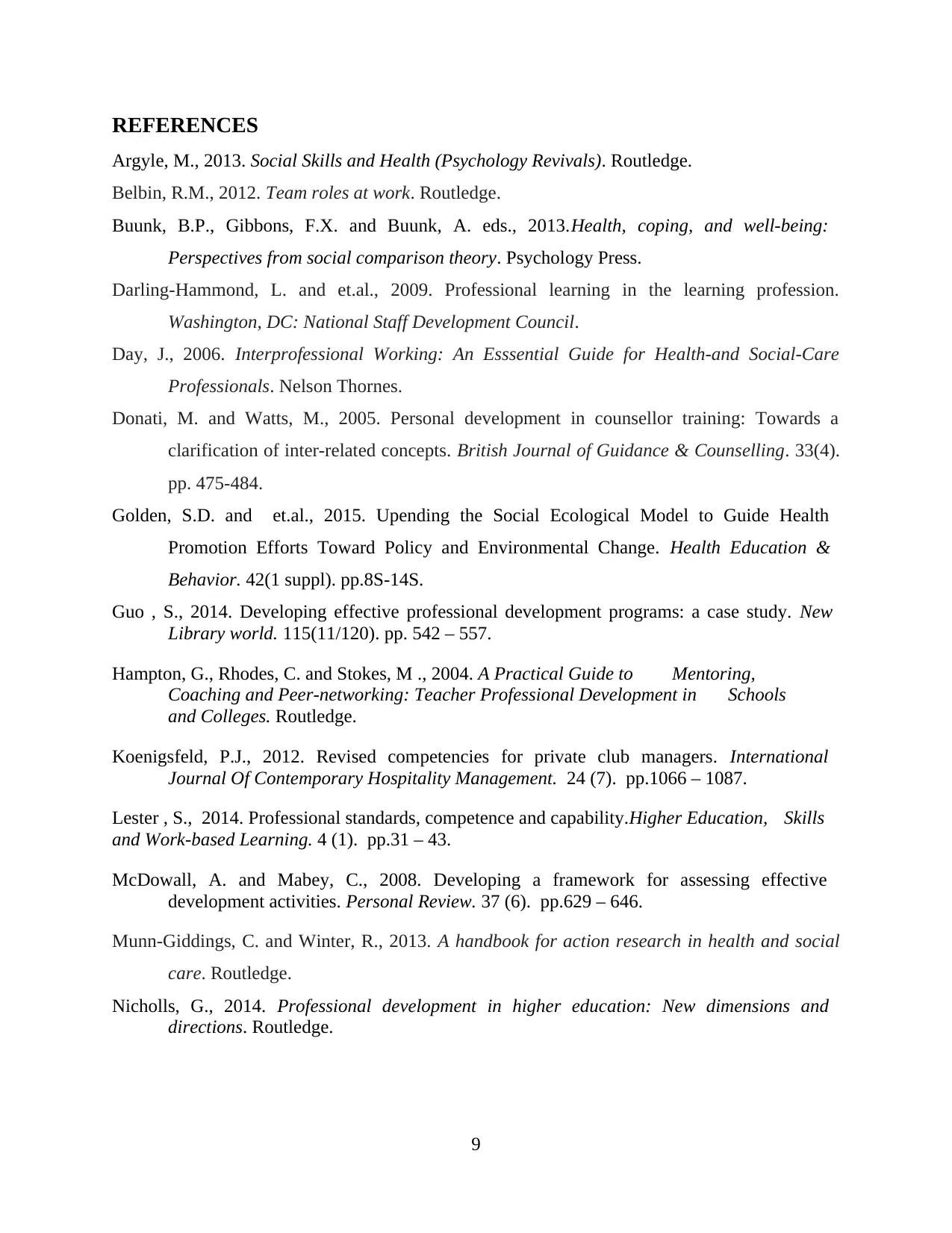
REFERENCES
Argyle, M., 2013. Social Skills and Health (Psychology Revivals). Routledge.
Belbin, R.M., 2012. Team roles at work. Routledge.
Buunk, B.P., Gibbons, F.X. and Buunk, A. eds., 2013.Health, coping, and well-being:
Perspectives from social comparison theory. Psychology Press.
Darling-Hammond, L. and et.al., 2009. Professional learning in the learning profession.
Washington, DC: National Staff Development Council.
Day, J., 2006. Interprofessional Working: An Esssential Guide for Health-and Social-Care
Professionals. Nelson Thornes.
Donati, M. and Watts, M., 2005. Personal development in counsellor training: Towards a
clarification of inter-related concepts. British Journal of Guidance & Counselling. 33(4).
pp. 475-484.
Golden, S.D. and et.al., 2015. Upending the Social Ecological Model to Guide Health
Promotion Efforts Toward Policy and Environmental Change. Health Education &
Behavior. 42(1 suppl). pp.8S-14S.
Guo , S., 2014. Developing effective professional development programs: a case study. New
Library world. 115(11/120). pp. 542 – 557.
Hampton, G., Rhodes, C. and Stokes, M ., 2004. A Practical Guide to Mentoring,
Coaching and Peer-networking: Teacher Professional Development in Schools
and Colleges. Routledge.
Koenigsfeld, P.J., 2012. Revised competencies for private club managers. International
Journal Of Contemporary Hospitality Management. 24 (7). pp.1066 – 1087.
Lester , S., 2014. Professional standards, competence and capability.Higher Education, Skills
and Work-based Learning. 4 (1). pp.31 – 43.
McDowall, A. and Mabey, C., 2008. Developing a framework for assessing effective
development activities. Personal Review. 37 (6). pp.629 – 646.
Munn-Giddings, C. and Winter, R., 2013. A handbook for action research in health and social
care. Routledge.
Nicholls, G., 2014. Professional development in higher education: New dimensions and
directions. Routledge.
9
Argyle, M., 2013. Social Skills and Health (Psychology Revivals). Routledge.
Belbin, R.M., 2012. Team roles at work. Routledge.
Buunk, B.P., Gibbons, F.X. and Buunk, A. eds., 2013.Health, coping, and well-being:
Perspectives from social comparison theory. Psychology Press.
Darling-Hammond, L. and et.al., 2009. Professional learning in the learning profession.
Washington, DC: National Staff Development Council.
Day, J., 2006. Interprofessional Working: An Esssential Guide for Health-and Social-Care
Professionals. Nelson Thornes.
Donati, M. and Watts, M., 2005. Personal development in counsellor training: Towards a
clarification of inter-related concepts. British Journal of Guidance & Counselling. 33(4).
pp. 475-484.
Golden, S.D. and et.al., 2015. Upending the Social Ecological Model to Guide Health
Promotion Efforts Toward Policy and Environmental Change. Health Education &
Behavior. 42(1 suppl). pp.8S-14S.
Guo , S., 2014. Developing effective professional development programs: a case study. New
Library world. 115(11/120). pp. 542 – 557.
Hampton, G., Rhodes, C. and Stokes, M ., 2004. A Practical Guide to Mentoring,
Coaching and Peer-networking: Teacher Professional Development in Schools
and Colleges. Routledge.
Koenigsfeld, P.J., 2012. Revised competencies for private club managers. International
Journal Of Contemporary Hospitality Management. 24 (7). pp.1066 – 1087.
Lester , S., 2014. Professional standards, competence and capability.Higher Education, Skills
and Work-based Learning. 4 (1). pp.31 – 43.
McDowall, A. and Mabey, C., 2008. Developing a framework for assessing effective
development activities. Personal Review. 37 (6). pp.629 – 646.
Munn-Giddings, C. and Winter, R., 2013. A handbook for action research in health and social
care. Routledge.
Nicholls, G., 2014. Professional development in higher education: New dimensions and
directions. Routledge.
9
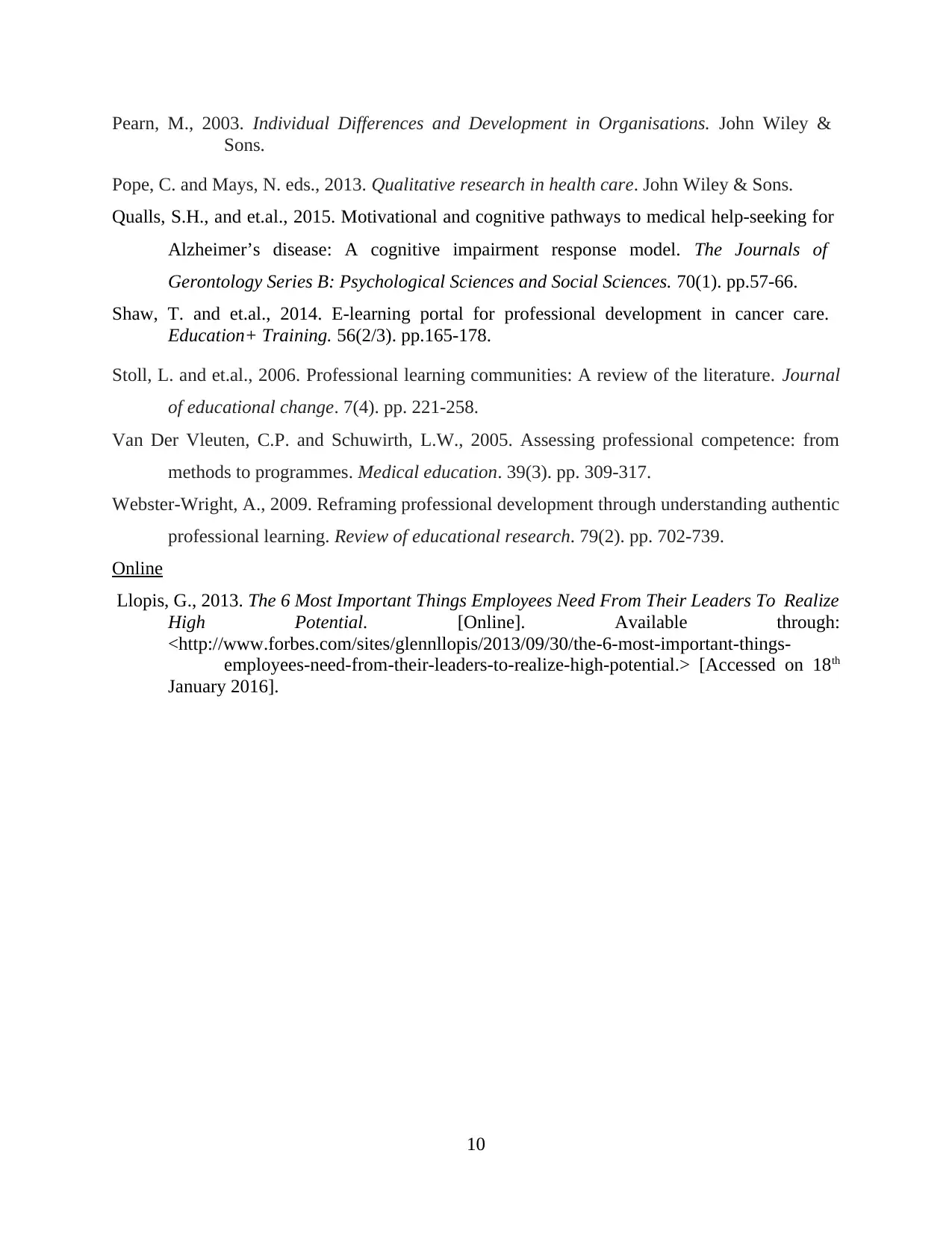
Pearn, M., 2003. Individual Differences and Development in Organisations. John Wiley &
Sons.
Pope, C. and Mays, N. eds., 2013. Qualitative research in health care. John Wiley & Sons.
Qualls, S.H., and et.al., 2015. Motivational and cognitive pathways to medical help-seeking for
Alzheimer’s disease: A cognitive impairment response model. The Journals of
Gerontology Series B: Psychological Sciences and Social Sciences. 70(1). pp.57-66.
Shaw, T. and et.al., 2014. E-learning portal for professional development in cancer care.
Education+ Training. 56(2/3). pp.165-178.
Stoll, L. and et.al., 2006. Professional learning communities: A review of the literature. Journal
of educational change. 7(4). pp. 221-258.
Van Der Vleuten, C.P. and Schuwirth, L.W., 2005. Assessing professional competence: from
methods to programmes. Medical education. 39(3). pp. 309-317.
Webster-Wright, A., 2009. Reframing professional development through understanding authentic
professional learning. Review of educational research. 79(2). pp. 702-739.
Online
Llopis, G., 2013. The 6 Most Important Things Employees Need From Their Leaders To Realize
High Potential. [Online]. Available through:
<http://www.forbes.com/sites/glennllopis/2013/09/30/the-6-most-important-things-
employees-need-from-their-leaders-to-realize-high-potential.> [Accessed on 18th
January 2016].
10
Sons.
Pope, C. and Mays, N. eds., 2013. Qualitative research in health care. John Wiley & Sons.
Qualls, S.H., and et.al., 2015. Motivational and cognitive pathways to medical help-seeking for
Alzheimer’s disease: A cognitive impairment response model. The Journals of
Gerontology Series B: Psychological Sciences and Social Sciences. 70(1). pp.57-66.
Shaw, T. and et.al., 2014. E-learning portal for professional development in cancer care.
Education+ Training. 56(2/3). pp.165-178.
Stoll, L. and et.al., 2006. Professional learning communities: A review of the literature. Journal
of educational change. 7(4). pp. 221-258.
Van Der Vleuten, C.P. and Schuwirth, L.W., 2005. Assessing professional competence: from
methods to programmes. Medical education. 39(3). pp. 309-317.
Webster-Wright, A., 2009. Reframing professional development through understanding authentic
professional learning. Review of educational research. 79(2). pp. 702-739.
Online
Llopis, G., 2013. The 6 Most Important Things Employees Need From Their Leaders To Realize
High Potential. [Online]. Available through:
<http://www.forbes.com/sites/glennllopis/2013/09/30/the-6-most-important-things-
employees-need-from-their-leaders-to-realize-high-potential.> [Accessed on 18th
January 2016].
10
⊘ This is a preview!⊘
Do you want full access?
Subscribe today to unlock all pages.

Trusted by 1+ million students worldwide
1 out of 12
Related Documents
Your All-in-One AI-Powered Toolkit for Academic Success.
+13062052269
info@desklib.com
Available 24*7 on WhatsApp / Email
![[object Object]](/_next/static/media/star-bottom.7253800d.svg)
Unlock your academic potential
Copyright © 2020–2026 A2Z Services. All Rights Reserved. Developed and managed by ZUCOL.





